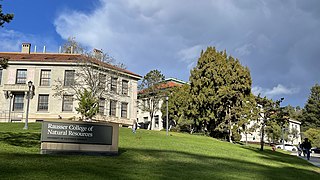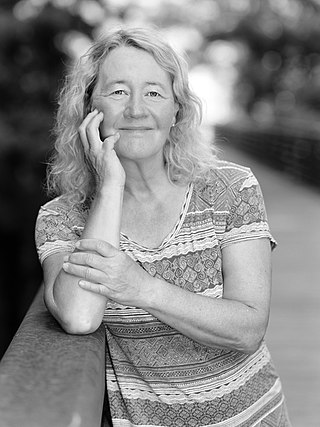Related Research Articles

Pollinator decline is the reduction in abundance of insect and other animal pollinators in many ecosystems worldwide that began being recorded at the end of the 20th century. Multiple lines of evidence exist for the reduction of wild pollinator populations at the regional level, especially within Europe and North America. Similar findings from studies in South America, China and Japan make it reasonable to suggest that declines are occurring around the globe. The majority of studies focus on bees, particularly honeybee and bumblebee species, with a smaller number involving hoverflies and lepidopterans.

The Rausser College of Natural Resources (RCNR), or Rausser College, is the oldest college at the University of California, Berkeley and in the University of California system. Established in 1868 as the College of Agriculture under the federal Morrill Land-Grant Acts, CNR is the first state-run agricultural experiment station. The college is home to four internationally top-ranked academic departments: Agriculture and Resource Economics; Environmental Science, Policy, and Management; Nutritional Sciences and Toxicology; and Plant and Microbial Biology, and one interdisciplinary program, Energy and Resources Group. Since February 2020, it is named after former dean and distinguished professor emeritus Gordon Rausser after his landmark $50 million naming gift to the college.

Wendy L. Brown is an American political theorist. She is the UPS Foundation Professor in the School of Social Science at the Institute for Advanced Study in Princeton, NJ. Previously, she was Class of 1936 First Professor of Political Science and a core faculty member in The Program for Critical Theory at the University of California, Berkeley.

Carolyn Widney Greider is an American molecular biologist and Nobel laureate. She joined the University of California, Santa Cruz as a Distinguished Professor in the department of molecular, cell, and developmental biology in October 2020.
Eva Harris is a professor in the School of Public Health at the University of California, Berkeley, and the founder and president of the Sustainable Sciences Institute. She focuses her research efforts on combating diseases that primarily afflict people in developing nations.
Sarah Perin "Sally" Otto is a theoretical biologist, Canada Research Chair in Theoretical and Experimental Evolution, and is currently a Killam Professor at the University of British Columbia. From 2008-2016, she was the director of the Biodiversity Research Centre at the University of British Columbia. Otto was named a 2011 MacArthur Fellow. In 2015 the American Society of Naturalists gave her the Sewall Wright Award for fundamental contributions to the unification of biology. In 2021, she was awarded the Darwin–Wallace Medal for contributing major advances to the mathematical theory of evolution.

Jennifer Anne Doudna is an American biochemist who has done pioneering work in CRISPR gene editing, and made other fundamental contributions in biochemistry and genetics. Doudna was one of the first women to share a Nobel in the sciences. She received the 2020 Nobel Prize in Chemistry, with Emmanuelle Charpentier, "for the development of a method for genome editing." She is the Li Ka Shing Chancellor's Chair Professor in the department of chemistry and the department of molecular and cell biology at the University of California, Berkeley. She has been an investigator with the Howard Hughes Medical Institute since 1997.

Judith P. Klinman is an American chemist, biochemist, and molecular biologist known for her work on enzyme catalysis. She became the first female professor in the physical sciences at the University of California, Berkeley in 1978, where she is now Professor of the Graduate School and Chancellor's Professor. In 2012, she was awarded the National Medal of Science by President Barack Obama. She is a member of the National Academy of Sciences, American Academy of Arts and Sciences, American Association for the Advancement of Science, and the American Philosophical Society.

Rosemary Gillespie is an evolutionary biologist and professor of Environmental Science, Policy & Management, Division of Insect Biology at the University of California, Berkeley. She was the President of the American Genetics Association in 2018 and was previously President of the International Biogeography Society 2013–2015. From 2011 to 2013 she had served at the president of the American Arachnological Society. As of 2020 she is the faculty director of the Essig Museum of Entomology and a Professor and Schlinger Chair in systematic entomology at the University of California, Berkeley. Gillespie is known for her work on the evolution of communities on hotspot archipelagoes.
Marvalee Hendricks Wake is an American zoologist and professor at the University of California, Berkeley, known for her research in the biology of caecilians and vertebrate development and evolution. A 1988 Guggenheim Fellow, she has served as president of the American Institute of Biological Sciences, the American Society of Ichthyologists and Herpetologists, Society for Integrative and Comparative Biology, International Union of Biological Sciences, and the International Society of Vertebrate Morphology. She is a fellow of the American Association for the Advancement of Science and the California Academy of Sciences, and is a member of the American Academy of Arts and Sciences.
Holly P. Jones is an American restoration ecologist and conservation biologist. She is an associate professor at Northern Illinois University.
Neelima Roy Sinha is an American botanist. She is a professor at the University of California Davis.
Marla Beth Feller is the Paul Licht Distinguished Professor in Biological Sciences and Member of the Helen Wills Neuroscience Institute at the University of California, Berkeley. She studies the mechanisms that underpin the assembly of neural circuits during development. Feller is a Fellow of the American Association for the Advancement of Science, member of the American Academy of Arts and Sciences and member of the National Academy of Sciences.
Irene Agnes McCulloch was a marine biologist and USC biological sciences professor. McCulloch started at the University of Southern California in 1924 where the marine biology research department lacked funding and resources. To better the research being done, McCulloch convinced George Allan Hancock to fund the G. Allan Hancock Foundation for Marine Research, which was then renamed the Hancock Institute for Marine Studies. McCulloch was given her own foundation in 1969 at USC to continue marine biology research. McCulloch studied microbes within the Pacific Ocean with her main focus being foraminifera.

Sarah Hake is an American plant developmental biologist who directs the USDA's Plant Gene Expression Center in Albany, CA. In 2009 she was elected a fellow of the American Association for the Advancement of Science and elected member of the National Academy of Sciences.
Katherine Snowden Pollard is the Director of the Gladstone Institute of Data Science and Biotechnology and a professor at the University of California, San Francisco (UCSF). She is a Chan Zuckerberg Biohub Investigator. She was awarded Fellowship of the International Society for Computational Biology in 2020 and the American Institute for Medical and Biological Engineering in 2021 for outstanding contributions to computational biology and bioinformatics.

Maria Elena Zavala is an American plant biologist. She was the first Mexican-American woman to earn a PhD in botany in the United States. She is currently a full professor of biology at the California State University-Northridge, studying plant development. She is a Fellow of the American Association for the Advancement of Science, the first Latina fellow of the American Society of Plant Biologists, the first Latina fellow of the American Society of Cell Biology, and an elected fellow of the Institute of Science. In 2000, she was awarded the Presidential Award for Excellence in Science, Mathematics, and Engineering Mentoring, which recognises individuals who have increased the participation of underrepresented minorities in their fields.
Adina Merenlender is a Professor of Cooperative Extension in Conservation Science at University of California, Berkeley in the Environmental Science, Policy, and Management Department, and is an internationally recognized conservation biologist known for land-use planning, watershed science, landscape connectivity, and naturalist and stewardship training.
Neal Mikkelsen Williams is an American pollination ecologist.
References
- ↑ "Claire Kremen". zoology.ubc.ca. Retrieved November 15, 2020.
- 1 2 Dinolfo, Adrianna (April 24, 2015). "Interview: Claire Kremen, conservation biologist". dailycal.org. Retrieved November 15, 2020.
- 1 2 Yang, Sarah (September 24, 2007). "Claire Kremen, UC Berkeley conservation biologist, wins MacArthur 'genius' fellowship". berkeley.edu. Retrieved November 15, 2020.
- ↑ Yang, Sarah (October 25, 2006). "Pollinators help one-third of world's crop production, says new study". berkeley.edu. Retrieved November 15, 2020.
- ↑ "Claire Kremen". hellmanfellows.org. Retrieved November 15, 2020.
- ↑ Tam, Jonathan (June 22, 2011). "Study encourages farmers to rely less on rented bees". dailycal.org. Retrieved November 15, 2020.
- ↑ Tuan, Lydia (October 15, 2013). "4 UC Berkeley faculty members elected fellows at the California Academy of Sciences". dailycal.org. Retrieved November 14, 2020.
- ↑ "Frontiers in Sustainable Food Systems welcomes new Field Chief Editor". frontiersin.org. March 12, 2018. Retrieved November 15, 2020.
- ↑ "UBC IRES Welcomes Dr. Claire Kremen!". ires.ubc.ca. 2019. Retrieved November 15, 2020.
- ↑ Balma, Chris (September 26, 2019). "UBC ecologist honored by American Museum of Natural History". science.ubc.ca. Retrieved November 15, 2020.
- ↑ Fawcett-Atkinson, Marc (November 15, 2020). "Pollinators key to sustainability, says Claire Kremen, 2020 Volvo" . Retrieved November 15, 2020.